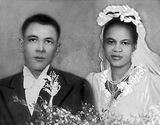In an interview conducted near the conclusion of the film, A South African Love Story – Walter and Albertine Sisulu, a journalist describes Walter Sisulu’s deliberately low-key, but profoundly influential role in the struggle to liberate South Africa from apartheid and successfully lay the groundwork for multi-racial elections in the country as that “not of the king, but the kingmaker”. It is a terse and enlightened observation that incisively encapsulates Sisulu’s fiercely intelligent, tenacious, and determined, yet humble, self-effacing, and disarmingly affable personality. The son of an interracial relationship who achieved a considerable measure of success in his professional life at a time when apartheid was still deeply entrenched, Sisulu became a formidable and enduring influence in the shaping of the African National Congress resistance movement during the 1930s and who, in the early 1940s, recruited and mentored a fiery, young (and then more militant) charismatic radical named Nelson Mandela and instilled in him a more deliberative and grounded approach to diplomacy and activism. However, Sisulu’s leadership and commitment to the anti-apartheid movement would also be matched by his equally resilient and determined wife, Albertine, a nurse by vocation whose innate capacity to nurture and instill hope led to a parallel women’s movement that led to the historic march in Pretoria that ultimately ushered a more globalized, humanitarian movement towards a more encompassing social equality. Affectionately tracing the evolution of Walter and Albertine Sisulu’s remarkable – and inspirational – life together, from their unusual courtship (Albertine had initially rejected Walter’s proposal with the unexpected news that she already had children, having adopted her siblings when her father died), to their supportive marriage of equals (the couple cultivated each other’s self-education and personal growth through substantive, everyday discourses on such diverse subjects as politics, philosophy, and culture), to Walter’s solitary confinement on Robben Island for his key role in the plotting of the Rivonia Uprising (in a political round-up and life sentencing of several high-ranking ANC leaders designed to suppress the movement), to Albertine and the children’s continued political activism and government harassment after Walter’s incarceration, to the commutation of Sisulu and Mandela’s life sentences and subsequent dismantling of apartheid, and finally, to the successful implementation of the first post-apartheid, multi-racial elections in South Africa, filmmaker Toni Strasburg presents an intimate, illuminating, and ennobled portrait of self-sacrifice, commitment, and enduring love in the face of oppression, inhumanity, interminable separation, and national struggle.
© Acquarello 2005. All rights reserved.
